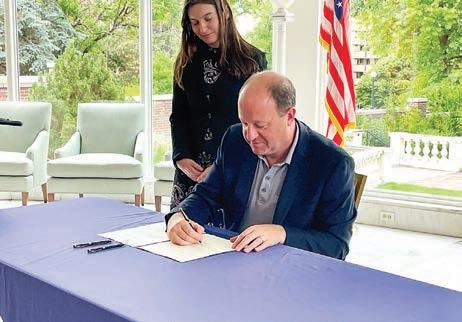
9 minute read
Thornton campaign finance reform advocates cheer on new state legislation
BY LUKE ZARZECKI LZARZECKI@COLORADOCOMMUNTITYMEDIA.COM
Grassroots organizers for campaign nance reform in ornton are content with a bill that passed the Colorado Legislature during the 2023 session that addresses what they campaigned for in 2022.
In 2022, ornton City Councilor Julia Marvin brought up the issue at two di erent meetings and a group of residents also testi ed for changes during public comment.
ose changes didn’t get enough support from council- ors at the time — only Marvin and City Councilors Kathy Henson and Karen Bigelow favored the reforms — so a group of residents set out to gather enough signatures to put a ballot initiative on ornton’s November 2022 ballot. e initiative would have limited contributions to $400 for council candidates and $800 for mayoral candidates, created more frequent reporting deadlines and more disclosures on campaign materials, banned corporate, special interest and union money and made it easier to understand rules that govern making donations. ey failed to collect the 8,565 signatures in 21 days they needed to get the local measure on the 2022 ballot.
But after January 1, 2024, things will change around campaign nance due to HB23-1245, which state legislators approved last month. Ryan Bauer, one of ornton’s advocates, said the bill hit most of the concerns they had.
“ ere were no limits before, more or less. And so now we’ve got some concrete limits and the idea being we would rather not have corporate interests or special interests being able to in uence our candidates with large dollar donations, I think it will accomplish that,” he said.
According to the bill’s summary, it will set limits on contributions from persons to candidates at $400 and from small donor committees at $4,000, require campaign contribution reports to be led with clerks at 60 days, 30 days and 15 days before the election and 30 days after, requires campaign contribution reports to be on a website for six years, as well as other new rules.
Rep. Jenny Willford of Northglenn and ornton was one of the sponsors of the bills and said this year and years prior, the rst contribution report is due after the race has already unfolded.
“People have already gotten mail, people have already heard from candidates. And that’s the rst chance that people have to see where the money’s coming from, and that’s just too late in the election,” she said.
Willford touted the requirements for clerks to make the contribution reports online so to view them, a formal request digital surveys, community focus groups, in-person interviews and sta interviews.
City Councilor Kathy Henson said there are more artists but the city has studied the matter before. e current lack of interest may be low because those to previous studies didn’t come to fruition.
City Councilor Adam Matkowsky suggested building a performing arts center in conjunction with a performing arts school. at would bring in more demand.
Buhler also said there is not su cient demand to ll a 500seat theater and it would be and understand where their money is,” Willford said.
A sledgehammer to a y used isn’t as often as it should be. It would also cost too much money to fund. However, a more exible space could be a di erent story. She said there’s a lot of demand for community gathering spaces, art galleries, maker spaces and banquet spaces.
Other ideas smaller municipalities wait until that 72-day mark. e new facility could focus on broad appeal and access and would need to be a gathering place for the community with the potential to serve as a city center and a nancial engine for the city.
With the theater not appearing feasible, sta suggested other options and considerations to explore through 2023.
Other potential opportunities included larger-scale development, a public-private partnership or a facility with different uses and purposes. They also suggested creating a potential downtown, an entertainment component like restaurants and bars and a theme-based development. One example in Colorado that was provided was McGregor Square in Denver which is south of Coors Field. isn’t required.
She wanted to see ve reporting deadlines as opposed to four but said it was a compromise in large part due to candidates in smaller municipalities who le their petitions to run closer to the election. And where the clerk’s o ce isn’t as large as bigger cities.
“When we increase the campaign nance reporting requirements, people are able to be better informed and hopefully understand the motivation behind the candidate
While Colorado Municipal League Executive Director Kevin Bommer said that CML was neutral on the donation limits, their main objections were to the workload the bill will place on clerks.
He said matters like campaign nance should be addressed at the local level and that there should not be a statewide interest in municipal elections.
He had issues with the 60day ling deadline because the nomination petition deadline in the municipal election code is 72 days before an election. He said most candidates in
And Bommer said that what may make sense in bigger cities, doesn’t always apply to the smaller ones.
“You’re asking a small town clerk that is probably the only sta , maybe has a deputy, to follow all these kinds of complicated requirements when the issues aren’t even relevant in small municipalities,” he said. “So it really is hitting a y with a sledgehammer.”
In cities like ornton, where candidates le as soon as Jan. 1 for an election in November, he said those governing bodies should adopt an ordinance. Earlier reporting deadlines in those cities make sense to him.
“I think the legislators forget that there are 273 municipalities in Colorado,” he said.
Power of grassroots movements
Much of the bill came from the grassroots organizers in ornton, Willford said.
“ is is a really great example of grassroots work turning into actual policy change, and it’s exactly why we need people who care about particular issues and care about our communities to speak up and to share what they want for the community,” she said.
One problem the organizers like Bauer ran into was the time limit to get all the signatures. He said they only had a couple of dozen volunteers.
“Between everybody’s work day, life schedules we just could not gather enough signatures to meet the threshold, unfortunately,” he said.
For future ballot initiatives, he’d like to see longer windows to make it more accessible for residents to put something on the ballot.
“When you have these special interests with large budgets, it’s not a problem for them to donate $10,000 to the candidate. at really can put your grassroots organizers and everyday citizens at a disadvantage because they don’t have those kinds of resources to further their message,” Bauer said.
FROM PAGE 1 recognizes successful events outside of the annual county fairs. is year’s celebration featured a water slide, volleyball, a foam cannon and a drag show leading up to the evening performance by pop star Bebe Rexha.



Denver LGBTQ pop-up organizers Rainbow Dome co-hosted the celebration, building an instant roller skating rink in the parking lot in front of the park’s Waymire Dome and presenting a ash mob there. Zoe Campo, Adams County cultural arts manager said the county brought in the group to help give it a sense of exuberance.
“We think this event is all about fun and joy and that’s what they brought,” Campo said.


A midway along the edge of the parking lot featured tents with county o ces and vendors selling art, rainbow-colored clothing and gear while a handful of food trucks and vendors fed attendees along the other side, closer to the Waymire Dome.
County Commissioner Emma Pinter said last year’s event was centered on the grassy area below the parking lot. is year, the main events tent, the foam cannon and games were still down there but the event itself grew to include much more of the Riverdale park.


“We just found that the tents worked much better on the pavement,” she said. “We’re still learning. It’s our second year, and we’re still working on it.”
Next level
But the key event this year was the Marriagepalooza, the mass wedding. Zygielbaum said that idea came from his department sta .
“We participated in Pride last year, but we wanted to take it to the next level,” Zygielbaum said. “Since we oversee the issuance of marriage licenses for Adams County we thought it could be a great event and we started planning it a couple of months ago.” e clerk’s o ce issued rainbowcolored marriage licenses to the couples that took their vows at the ceremony. Zygielbaum said there was plenty of interest from couples.




“Hopefully next year, we’ll be able to double the size and we hope to be doing the event for a long time,” he said.
One of the couples, Tige Heacock and Jason Godtzinger, said they didn’t initially plan to get married at an event. Heacock said she wanted to get married on June 10, since it was her grandparents’ anniversary.
“We had planned to rent Boetcher Mansion and we went online to nd out what we needed to do for a marriage license and we saw Marriagepalooza,” Heacock said. “We have a ton of friends that we support and some that are getting married this year. We tried to get them to come out today, but they couldn’t. But we wanted to support everybody else and be part of the day.”
Pinter said the event is not meant to be politically provocative but simply to represent people that live in Adams County.
“I think it’s important to celebrate our whole community, and we do all sorts of celebrations throughout the year,” she said. “We just celebrated the opening of a new Veterans Memorial on Memorial Day and we’re about to do our Stars and Stripes for Fourth of July. is is another in the calendar of events where we celebrate our community. And this is very important to let our LGBTQ community members know we are celebrating them too.” various elements of Senate Bill 213, it still will have an impact. e bill will require that local governments at least have a hearing for new developments before deciding whether to reject them, Lindstedt said.
“It really does point the nger at the worst kind of action that you can see from a local government to limit housing,” he said.
House Bill 1255 aims to address the availability of housing by stripping local governments’ ability to limit how much new housing can be added to their communities.
“Anti-growth laws enacted by local governments severely undermine the ability to construct the additional housing units Coloradans need,” the legislative declaration in the bill said.
“ e impact is big with (the) cities being preempted, but the larger impact is that other communities can’t get on that policy and make the problem worse,” he said.
Local governments across the state were strongly opposed to both House Bill 1155 and Senate Bill 213, calling them an overreach by the state and complaining that they would prevent communities from deciding how to address their unique needs. e letter argued the bill could harm the state’s water supply, rural lands and agricultural areas, and that it failed to encourage any new a ordable housing. e bill o ers temporary exemptions for local governments that need to develop their infrastructure, including water services, to accommodate growth. Also excluded from the ban are areas with inclusionary housing ordinances, which require a certain amount of a ordable housing to be built each year, and local governments that have recently experienced a natural disaster and have been inundated with new construction requests, such as the town of Superior, which was hard hit by the 2021 Marshall re. Golden’s growth cap, which limits residential development to 1% each year, was approved by voters in 1995. is year, the cap permitted only 88 new units. e bill’s other sponsors are Rep. Ruby Dickson, D-Greenwood Village and Sen. Julie Gonzales, D-Denver.
House Bill 1255, however, didn’t receive nearly as much attention — or blowback — as its counterpart.
“ at one got overshadowed by the clearly more sweeping Senate Bill 213,” said Kevin Bommer, executive director of the Colorado Municipal League.
Still, the Colorado Municipal League, which represents cities and towns across the state, viewed House Bill 1255 as a similar attack on local control.
Elected o cials in Pitkin, San Miguel, Routt, Summit and Huerfano counties signed a joint letter opposing the bill in May. Mayors and council members in Aspen and Fountain signed on as well.

“ is bill responds to the policies of four Colorado municipalities, but strips away critical tools utilized by local governments across the state to actually achieve a ordable housing, reduce sprawl and incentivize the prudent planning of water, natural resources and infrastructure development,” the letter said.
Lakewood’s cap, which was approved by voters in 2019, has the same 1% restriction per year. In 2022, about 700 units were permitted.
Boulder has the same cap, which allows about 400 new units each year. It was originally enacted in the city in 1975 with a 2% limit then was reduced further to 1% in 1995.
June 7 was the deadline for Polis to sign or veto any bills passed by the legislature during its 2023 lawmaking term, which ended May 8. House Bill 1255 was the nal measure to receive a bill signing ceremony, which Polis said was intentional because he thinks the measure is so important. is story is from e Colorado Sun, a journalist-owned news outlet based in Denver and covering the state. For more, and to support e Colorado Sun, visit coloradosun.com. e Colorado Sun is a partner in the Colorado News Conservancy, owner of Colorado Community Media.
Any bills the governor doesn’t veto or sign will automatically become law at midnight.











